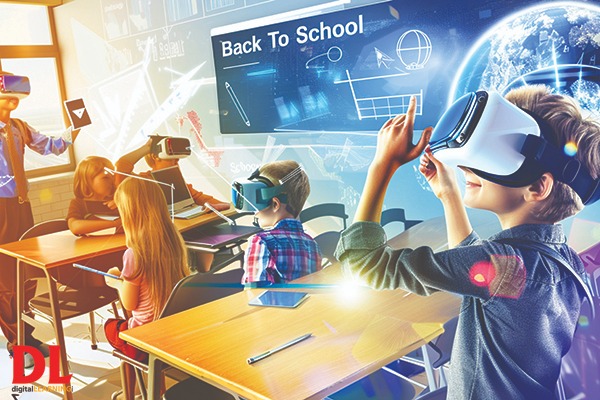
Finance Minister Sitharaman’s 2025-26 Union Budget signals a major shift, prioritizing education, skill development, and infrastructure, and embracing the power of technology to transform the learning experience.
From AI-powered learning platforms to cutting-edge research in educational technology, the government is poised to transform classrooms across the nation. This ambitious push promises to bridge the digital divide, ensuring that every student, regardless of their background, has access to high-quality education.
The nation’s commitment to building a future-ready workforce, equipped to thrive in the age of artificial intelligence, is evident in the substantial budgetary allocations and targeted initiatives outlined in the 2025-26 Union Budget. This ambitious agenda aims not only to bridge the digital divide and democratize access to quality education but also to position India as a global leader in technological innovation and a hub for cutting-edge research. The focus on integrating AI into the education ecosystem, coupled with a renewed emphasis on skill development and vocational training, promises to enhance global competitiveness and empower a generation of innovators and problem-solvers.
The education sector’s budget has seen a considerable jump to ₹1.3 lakh crore, up from ₹1.1 lakh crore the previous year. This funding is divided between higher education (₹50,067 crore) and school education (₹78,572 crore), with a strong emphasis on bridging the digital gap. A key initiative involves expanding broadband access to government schools and primary health centers in rural areas, aiming to level the playing field after the pandemic’s disruptive impact.
The Indian Institutes of Technology (IITs) are leading this educational evolution. Five newer IITs, located in Jammu, Bhilai, Dharwad, Palakkad, and Tirupati, will collectively add 6,500 student seats over the next five years. This expansion builds on the already impressive doubling of student capacity across all 23 IITs in the last decade, from 65,000 to 1.4 lakh. Increased funding for IITs, now at ₹11,349 crore (compared to ₹10,467 crore in 2024-25), highlights the government’s commitment to advanced research and technological progress.
Beyond infrastructure, the budget invests in talent. 10,000 technology research fellowships at IITs and IISc will nurture future innovators. The creation of 50,000 Atal Tinkering Labs in government schools, along with five new National Centres of Excellence (CoEs) focused on skilling, will provide hands-on learning opportunities. For the integration of AI in the education ecosystem to create a future-ready workforce to thrive in the AI-driven economy, a dedicated allocation of ₹500 crore for a Centre of Excellence in AI for education has been announced. This also demonstrates the government’s vision of integrating cutting-edge technologies into learning.
Skill development and vocational training are also prioritized. ₹3,000 crore has been earmarked for modernizing Industrial Training Institutes (ITIs) and ensuring their courses align with industry needs. Furthermore, substantial funding growth for the India-AI Mission, from ₹173 crore in 2024-25 to ₹2,000 crore in 2025-26, underscores the importance of artificial intelligence in developing a future-ready workforce. These combined efforts are expected to stimulate economic growth, create more job opportunities, and cultivate a skilled workforce capable of meeting the demands of a rapidly evolving economy.
The All India Council for Technical Education’s (AICTE) declaration of 2025 as the “Year of AI” further emphasizes this commitment. By empowering over 14,000 colleges and 40 million students with AI knowledge and skills, AICTE aims to create a generation of AI-ready professionals who can contribute to India’s emergence as a global leader in artificial intelligence. This initiative will not only equip students with the technical skills needed to thrive in the AI-driven economy but also foster a deeper understanding of the ethical and societal implications of AI, ensuring that its development and deployment are guided by principles of responsible innovation.
The vision for India’s educational transformation extends beyond technical skills and focuses on nurturing well-rounded individuals who are not only competent professionals but also responsible global citizens. As Dr. Suresh D. Mane, Principal, Dr D Y Patil Pratisthans College of Engineering, articulates, “In 2025, we will empower our students to become responsible global citizens and leaders.” This emphasis on holistic development includes integrating the Sustainable Development Goals (SDGs) into the curriculum, fostering intercultural competence through international collaborations, and promoting ethical leadership.
Also Read: AI Credit Solutions for Rural Students & NBFCs’ Role in Digital Learning
Union Education Minister Dharmendra Pradhan’s description of the 2025-26 budget as a “significant step toward an inclusive and empowered India” captures the essence of this transformative vision. The increased investment in education, coupled with the focus on skill development, AI integration, and global citizenship, promises to create a more equitable and prosperous society.
By empowering individuals with the knowledge, skills, and values they need to thrive in the 21st century, India is laying the foundation for a future where its citizens are not only globally competitive but also deeply committed to building a better world. This comprehensive and forward-looking approach to education is not just about preparing individuals for jobs; it is about shaping a generation of leaders, innovators, and problem-solvers who will drive India’s progress and contribute to global well-being.






















